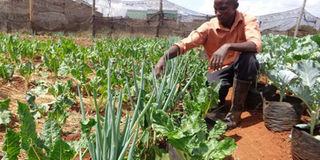Shrinking land sizes make Kiambu farmers smarter

Simon Wagura on his employer’s farm in Kiambu County where they grow vegetables in plastic bags. PHOTO | LEOPOLD OBI | NATION
What you need to know:
- 6,000 smallholder farmers in Ruiru sub-county trained on peri-urban agriculture.
- The potted farming concept is among many urban farming initiatives being promoted by the county government to agribusiness.
- Besides potted farming, greenhouses have also gained traction as farmers embrace them with the help of the county government.
- Faith Kariuki, Ruiru sub-county crop officer, says the greenhouses are given to farmers who have organised themselves into groups.
Karuguru in Ruiru town, located some 35 minutes outside Nairobi, is a fast developing peri-urban settlement.
Like many other satellite towns in Kiambu County, it has found itself on the edge due to rapid real estate development fuelled by a moneyed middleclass in Nairobi.
But confronted with the challenge of shrinking farming land, farmers are becoming innovative.
Benson Njoroge is among those making a lemonade out of lemons. He grows vegetables in plastic bags on a farm measuring 14 by 14m in Karuguru, off the Eastern bypass.
The black polythene bags are filled with poultry manure, red soil and small stones (pebbles) that enable water to drain.
“Other than space, water is a challenge here, we therefore find planting vegetable in polythene bags an efficient method,” explains Simon Wagura, who holds a degree in community development from Moi University and manages the farm.
Before his employer established the farm, Wagura said he reclaimed the rocky piece of land by adding red soil to it.
“We first secured the farm using barbed wires then imported two lorries of red top soil, which we then mixed with poultry manure to come up with an arable farm,” explained Wagura.
The farmer grows sukuma wiki, spinach, coriander (dhania) and bulb onions.
“We have planted onions all-round the block because they have very strong smell, which repels pests,” explained
GREENHOUSES
Wagura, adding they sell the veges in the neighbourhood. From the vegetables, they earn up to Sh1,400 a day.
The potted farming concept is among many urban farming initiatives being promoted by the county government to agribusiness.
Agricultural officers from the county say such initiatives enhance food production while at the same time creating employment opportunities for the youth like Wagura, who also raises sukuma wiki seedlings which he sells to farmers at Sh2 each.
Besides potted farming, greenhouses have also gained traction as farmers embrace them with the help of the county government.
Focal Area Development Committee group is one of those that have received greenhouses from the county. The structure measuring 8 by 18 metres was handed to them in 2014.
The farmers have been growing tomatoes in greenhouse since then, with the crops currently flowering.
According to Elizabeth Wangari, a member, they rotate the tomatoes with peas. Though not a high value crop compared to horticultural crops such as capsicum and tomatoes, peas are leguminous plants whose allelopathic roots help cure the soil of common soil diseases.
In Juja sub-county, members of Dam Site Self-Help Group, another group of farmers who were given a greenhouse by the county government, have also planted tomatoes which they will be harvesting in two months’ time.
Margaret Wanjiru, the farmer whose land hosts the greenhouse, narrated that they bought two lorries of top soil, 45 bags of animal manure and mixed thoroughly before planting the tomatoes.
The nine-member group received the greenhouse May this year and planted Anna F1 tomato varieties.
SELL DIRECTLY TO CONSUMERS
At planting, they drenched the seeds with basillus and trichodama to drive away soil-borne diseases such as tomato blight.
“After three days of planting, we fed the seedlings with NPK fertiliser and top-dressed later after a month with NPK,” explained Margaret, adding that county crop officers visit their farm once every week to monitor their progress and to provide extension services.
Faith Kariuki, Ruiru sub-county crop officer, says the greenhouses are given to farmers who have organised themselves into groups.
Kiambu has 12 sub counties, and each received at least seven greenhouses.
“We have so far trained over 6,000 smallholder farmers in Ruiru sub-county and our focus is peri-urban agriculture, hanging gardens, potted farming, intensification for open field irrigation,” said Faith, adding they urge farmers to sell directly to consumers to avoid being exploited by brokers.
****
Fighting off the threat from Real Estate
- Even with threat from real estate, experts note that urban dwellers should not take a back seat waiting to be fed by rural residents yet they can generate food and wealth from their tiny parcels of land.
- The best way to farm in places where land sizes are shrinking is to concentrate on what one is passionate about. If it is livestock, keep cows or chicken. This will help you plan your farm better but there is no harm in diversifying to earn more.




